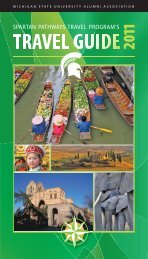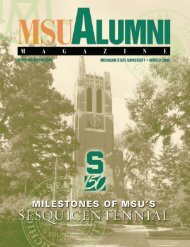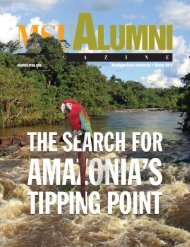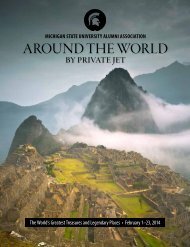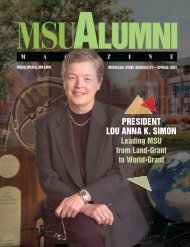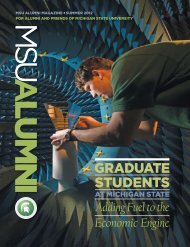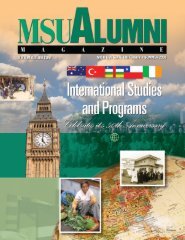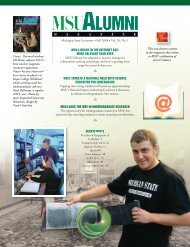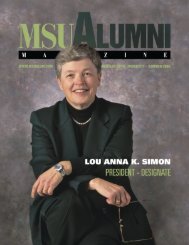Download - MSU Alumni Association - Michigan State University
Download - MSU Alumni Association - Michigan State University
Download - MSU Alumni Association - Michigan State University
Create successful ePaper yourself
Turn your PDF publications into a flip-book with our unique Google optimized e-Paper software.
<strong>MSU</strong> STUDY OF<br />
CEREBRAL MALARIA<br />
In the most comprehensive<br />
study to date of the disease in<br />
African children, it was found<br />
that almost a third of cerebral<br />
malaria survivors developed<br />
epilepsy or behavioral disorders.<br />
The research, led by Gretchen<br />
Birbeck, associate professor of<br />
neurology and ophthalmology in<br />
<strong>MSU</strong>’s College of Osteopathic<br />
Medicine, appears in The Lancet<br />
Neurology.<br />
Cerebral malaria is a severe<br />
form of malaria affecting the<br />
brain, occurring predominantly<br />
in children, with a mortality rate<br />
of 15-25 percent. It affects about<br />
one million children every year,<br />
primarily in sub-Saharan Africa.<br />
“Our findings show that children<br />
with cerebral malaria are at<br />
risk of developing several adverse<br />
neurological outcomes including<br />
epilepsy, disruptive behavior<br />
disorders and disabilities characterized<br />
by motor, sensory or<br />
language deficits,” says Birbeck,<br />
also director for the International<br />
Neurologic & Psychiatric<br />
Epidemiology Program. “The<br />
modifiable risk factors for these<br />
disorders in children with cerebral<br />
malaria are acute seizures<br />
and extreme fevers.”<br />
“We need to be more aggressive<br />
in treating the two major<br />
Click Right Through for <strong>MSU</strong><br />
alumni.msu.edu<br />
risk factors: seizures and high<br />
fever,” she said, adding that the<br />
next step will be to start clinical<br />
trials to identify treatments<br />
aimed at better seizure and fever<br />
control.<br />
Snapp<br />
Birbeck<br />
GREEN REVOLUTION<br />
IN AFRICA<br />
Crop diversification with<br />
shrubby legumes mixed with<br />
soybeans and peanuts could be<br />
the key to sustaining the green<br />
revolution in Africa. An <strong>MSU</strong><br />
study published in the Proceedings<br />
of the National Academy of<br />
Sciences (Nov. 22, 2010) found<br />
that diversifying crops could<br />
boost production of nutrientenriched<br />
grain by 12 percent to<br />
23 percent.<br />
Sieglinde Snapp, a crop and soil<br />
scientist at <strong>MSU</strong>’s Kellogg Biological<br />
station who led the study,<br />
says that food and environmental<br />
security in Africa could be enhanced<br />
by, for example, rotating<br />
corn with pigoenpea mixtures to<br />
keep the soil from being stripped<br />
of nutrients while increasing<br />
nutrient-rich grain productivity.<br />
This has taken place in Malawi,<br />
the so-called cradle of Africa’s<br />
green revolution.<br />
“This diversified rotation provides<br />
multiple benefits compared<br />
to simply planting a continuous<br />
corn crop,” says Snapp, who was<br />
assisted by researchers from the<br />
the Farmhouse (Norwich, U.K.),<br />
the <strong>University</strong> of Florida, the<br />
<strong>University</strong> of Western Ontario<br />
(Canada) and the <strong>University</strong> of<br />
Malawi.<br />
NEW PLACES TO<br />
GROW BIOFUELS<br />
<strong>MSU</strong> researchers are finding<br />
new, perhaps surprising locations<br />
to grow crops used for biofuel.<br />
Dennis Pennington, an <strong>MSU</strong><br />
Extension bioenergy educator, is<br />
working with a team to identify<br />
possibilities for producing cellulosic<br />
and oilseed biofuel crops for<br />
the “Freeways to Fuels” project.<br />
The goal is to determine whether<br />
biofuel crops can be produced<br />
on nontraditional land, such as<br />
highway rights of way, vacant<br />
urban land and airport property.<br />
“When producing crops for<br />
biofuels, we don’t want to take<br />
away farmland that’s being used<br />
for food crops,” Pennington says.<br />
“So the question is, where else<br />
could we plant? <strong>Michigan</strong> has a<br />
lot of non-traditional land with<br />
poorer soils that might provide<br />
a location for biofuels crop<br />
production.”<br />
Pennington and his team<br />
will grow switchgrass and three<br />
oilseed crops: oriental mustard,<br />
pennycress and canola. These are<br />
low-growing crops that will not<br />
block people’s lines of sight and<br />
do not attract wildlife.<br />
“Harvesting, processing and<br />
utilizing our own homegrown<br />
bioenergy feedstocks can help<br />
grow <strong>Michigan</strong>’s economy,<br />
preserve our environment and<br />
decrease our dependence on<br />
foreign oil,” adds Terri Novak<br />
of <strong>Michigan</strong>’s Department of<br />
Energy, Labor and Economic<br />
Growth.<br />
<strong>MSU</strong> KUDOS<br />
Every quarter, <strong>MSU</strong> faculty,<br />
staff and students garner kudos<br />
too numerous to list exhaustively<br />
here. Some examples:<br />
Asgi Fazleabas, director of<br />
<strong>MSU</strong>’s Center for Women’s<br />
Health Research and associate<br />
chair of the College of Human<br />
Medicine’s Department<br />
of Obstetrics, Gynecology and<br />
Reproductive Biology, received<br />
the Society for the Study of<br />
Reproduction 2010 Research<br />
Award of the American Society<br />
for Reproductive Medicine.<br />
Three <strong>MSU</strong> professors have<br />
been named Fulbright Scholars—Alan<br />
Beretta, professor<br />
of Linguistics and Languages,<br />
will conduct research in Greece;<br />
Adam Candeub, associate<br />
professor at the <strong>MSU</strong> College<br />
of Law, will study cybercrime<br />
in Croatia; and Sayuri Guthrie<br />
Shimizu, associate professor of<br />
history, will study in Japan.<br />
Three individuals with connections<br />
to the <strong>MSU</strong> College<br />
Page 7




